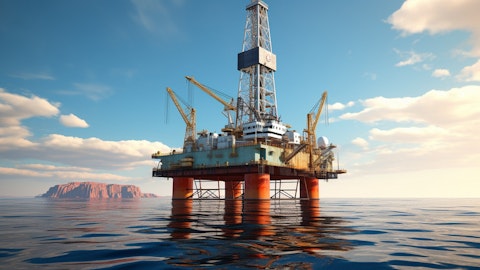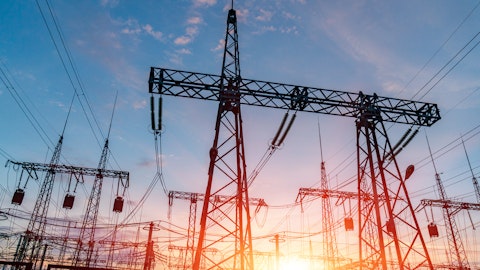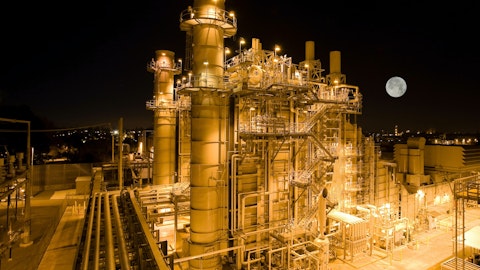Zack Van Everen: Hi, guys. Thanks for taking my question. Just to start on the EBITDA guidance, could you touch on what would get you to the low end versus high end with how contracted you are? Is there still some marketing opportunities baked in or gas sales in there as well?
Steven Kobos: Dana and I can both speak to that. I mean, in terms – well, first of all, hi, good morning, Zack.
Zack Van Everen: Good morning.
Steven Kobos: Yes, good morning. In terms of what could push it down, I mean, I think that would probably be more likely than anything, an increase in development expense spend as we get further traction than we might expect on some opportunities. That would be one driver. But what would you add to?
Dana Armstrong: So, Zack, what I will say is that we feel very confident about this range. There’s not a lot of upside. There’s not a lot of downside. The upside obviously would be if we do more Cargos, but as you know, all of our 10 vessels are on contract. So we don’t expect to blow out this range. We expect to come in within this guidance. If we are successful in doing several carter deals like we did last year, then that could obviously drive it up. So there’s definitely that possibility. As Steven said, there’s a possibility that we invest more in our business development that could potentially drive it down, but we don’t expect it to go beyond the $315 million. So we do feel very good about the $315 million to $335 million range. But to your point, with all of our vessels on long-term contracts, that does give us really good visibility into 2024, and so we feel like we’re going to be within this range this year.
Zack Van Everen: Got you. And then maybe just one more on the international market and obviously the news with the DOE here in the U.S. When you guys look at future SPAs, you have signed some in the U.S. and obviously international as well. Are you leaning more towards SPAs internationally as the U.S. kind of works through its regulatory environment? Or is there really a preference there?
Steven Kobos: No. I think, Zack, we are – first, I’d say we’re pleased with the suppliers that we have agreements with currently Spencer Global, that’s QatarEnergy, very happy with both those deals. There’s definitely interest from some parties for Henry Hub indexed long-term deals. We like the U.S. At the same time, you just saw just in the past few days, QatarEnergy announced an additional 16 million tons coming up that’s going to take their total up to 144. This just means, there is a continuing demand for increasing demand for LNG around the world. Other producers will step up if the U.S. doesn’t. We’re somewhat agnostic. We hope there will be further U.S. production. We think it’s in the best interest of the U.S. and a harmonious global system that people can afford this product and access it widely.
You’ve seen some nations increase significantly their targets for natural gas in recent weeks as part of their mix. That’s usually to the disadvantage of coal. So we’re in favor of and think it’s great for the U.S. or any other market to increase its LNG production.
Zack Van Everen: Got you. That’s all I had. I appreciate the time. Thanks, guys.
Steven Kobos: Thank you.
Operator: [Operator Instructions] We now have a follow-up from Chris Robertson from Deutsche Bank. Your line is now open. Please go ahead.
Unidentified Analyst: Hi. Yes, thanks for taking our follow-up. This is Ben Moore again for Chris Robertson. Looking at the SPA for QatarEnergy and the sales agreement with Petrobangla for the volumes you’ve discussed, can you talk a bit about how these contracts are structured? Have you locked in a particular margin based on your purchase price of LNG volumes plus the cost of transport and regas?
Steven Kobos: Thanks. Thanks for that, Ben. I’m going to throw that one back over to Oliver Simpson, who will answer without going into too much detail.
Oliver Simpson: Thanks, Steven. Thanks, Ben. I think on that one, I mean, I think we have – we entered into a long-term agreement with Petrobangla to sell LNG in Bangladesh and we backfilled it with a long-term DS supply agreement from Qatar. So on that, in terms of volume delivery location, it is pretty much the two contracts are aligned and we have a fixed margin in between the two. So I think there are fairly derisked contracts in that sense.
Steven Kobos: And that’s in line with what we’ve said philosophically about commodities for some time and the fact we’re looking for infrastructure uplift.
Unidentified Analyst: Wonderful. That’s my one. Thank you so much.
Steven Kobos: Thanks, Ben.
Operator: That concludes the Q&A portion of today’s call. I will now turn the session back over to Craig Hicks for final comments.




